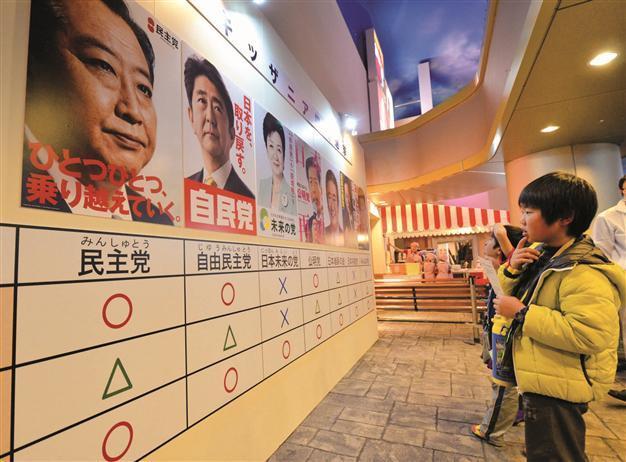Relations with US to top new agenda of Japan government
TOKYO - Hürriyet Daily News

Children look at campaign posters highlighting the candidates from Japan’s major parties before they cast their votes in a straw poll for the upcoming
Japan’s prospective next ruling party, the Liberal Democrats, seems likely to have a full inbox after the Dec. 16 elections with urgent, U.S.-related issues to address, such as ties with Washington and the Trans-Pacific Partnership, another U.S. initiative.“The consolidation of bilateral ties with the U.S. will be among the priorities of Shinzo Abe if elected,” a Japanese Foreign Ministry official told the Hürriyet Daily News during a meeting with journalists in Tokyo on Dec. 14.
“His first international flight might be to the U.S.,” the official said. The Trans-Pacific Partnership (TPP) talks, a process that currently involves 11 countries but could soon include Japan as well, is also on the agenda, the source said.
“Participation in the TPP would boost Japan’s economic growth by increasing two-way trade with member economies, reducing operating costs for businesses in Japan, lowering prices for Japanese consumers and opening the way for more foreign direct investment in Japan,” The Japan Times quoted a joint statement released last month by U.S and Japanese businesspeople as saying.
Abe, a right winger, has already said he will strengthen trans-Pacific ties, mainly to cope with the latest challenges from China. The former prime minister, who today leads the Liberal Democratic Party (LDP) and its ally, New Komeito, may win up to 300 seats in the 480-member lower house, polls in the Japanese media said earlier this week.
Current Prime Minister Yoshihiko Noda, who does not have much chance of securing his seat, according to surveys, has also pledged to focus on ties with the United States following criticism that had not pursued enough relations with the world’s largest economy.
Another critical step for the new prime minister might be a change in the electoral system, the source said.
Japan is also approaching a deadline to discuss the budget for the next fiscal year, which starts in April, but officials do not expect a major shift in the budget.
The new prime minister will seek to avoid losing public support with sharp moves until elections for the upper house in June, officials said. However, recent disputes with China over uninhabited islands in the East China Sea known as Senkaku in Japanese and Diaoyu in China, as well as rising tensions with North Korea, which peaked with a missile exercise earlier this week, might challenge the newcomer.
Noda has also received some criticism for his moderate stance toward China on the island row amid Abe’s more vocal anti-China discourse.
If elected, Abe, who quit as prime minister in 2007, will be the second Japanese prime minister to return to office following resignation after Shigeru Yoshida, who ruled the country after World War II.
Still, Foreign Ministry officials believe ratcheting up the tensions over the islands is mere electioneering and that strong business ties between Tokyo and Beijing will help overcome the dispute. There are 23,000 Japanese businesses in China, including large firms such as Toyota Motor.
The two countries are “destined to grow together,” one Foreign Ministry official said. “There are no problem-free relations in the world. Neighbors cannot change partners.”
















